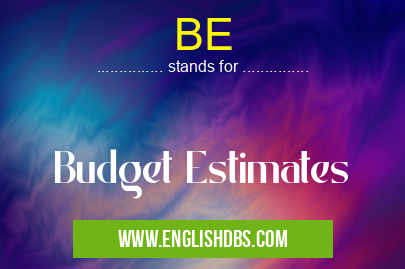What does BE mean in ACCOUNTING
BE stands for Budget Estimates, a type of analysis that is used to determine the financial performance of a business. It involves determining the expected costs and revenues for a given period, analyzing budget variances, and assessing the accuracy of budget forecasts. Businesses use BE to plan strategically and make informed decisions about operational activities. As these budgets are essential to the success of a business in terms of its profitability and sustainability, it is important to understand what BE means.

BE meaning in Accounting in Business
BE mostly used in an acronym Accounting in Category Business that means Budget Estimates
Shorthand: BE,
Full Form: Budget Estimates
For more information of "Budget Estimates", see the section below.
» Business » Accounting
Essential Questions and Answers on Budget Estimates in "BUSINESS»ACCOUNTING"
What are Budget Estimates?
Budget Estimates are a forecasting tool used to inform the budget-making process. It involves estimating revenues, expenditures and capital investments by the government for a given period of time
Who is responsible for preparing the Budget Estimates?
Government finance departments or budgetary offices usually prepare the estimates. This process can involve input from other government departments or agencies as well.
How often should Budget Estimates be prepared?
It depends on the size and scope of government operations. Most public sector organisations will review their Budgets annually and update other projections more regularly when needed.
How reliable are Budget Estimates?
While no fiscal estimate can be perfectly accurate, they do provide valuable guidance for budget makers. Generally speaking, budget estimates aim to be realistic forecasts of what might happen in the future, rather than exact predictions of what will happen.
How can I use Budget Estimates to inform my own financial decisions?
Understanding how public funds are allocated can provide insight into how you might manage your own money more efficiently. Furthermore, understanding how different sectors rely on overall fiscal health can give you a better view into economic trends.
What factors should I consider when making my own Budget Estimate?
When creating your own budget estimate it’s important to factor in any expected changes in income or expenses (including inflation). Have an honest assessment of any potential risks and plan accordingly. Make sure that any assumptions you make are realistic and achievable
Final Words:
In conclusion, understanding what BE means is essential for successful decision making in finance-related activities. By using this analysis tool correctly and regularly reviewing their budgets with realistic assumptions in mind, business owners will be able to allocate funds effectively and make more accurate predictions regarding their future earnings potentials.
BE also stands for: |
|
| All stands for BE |
